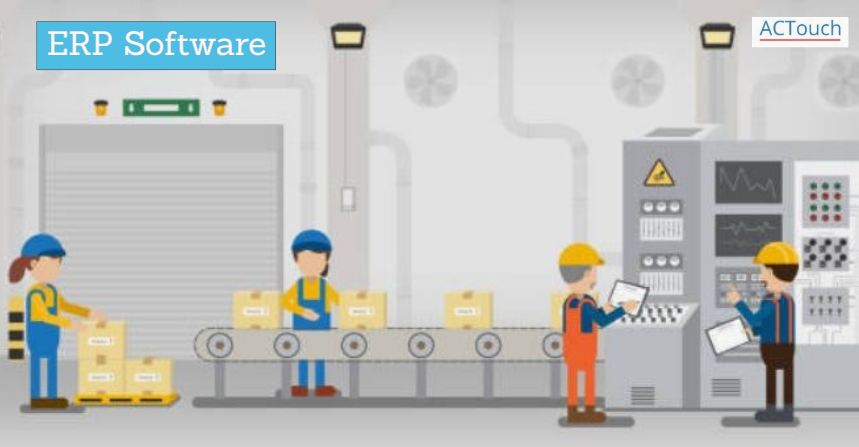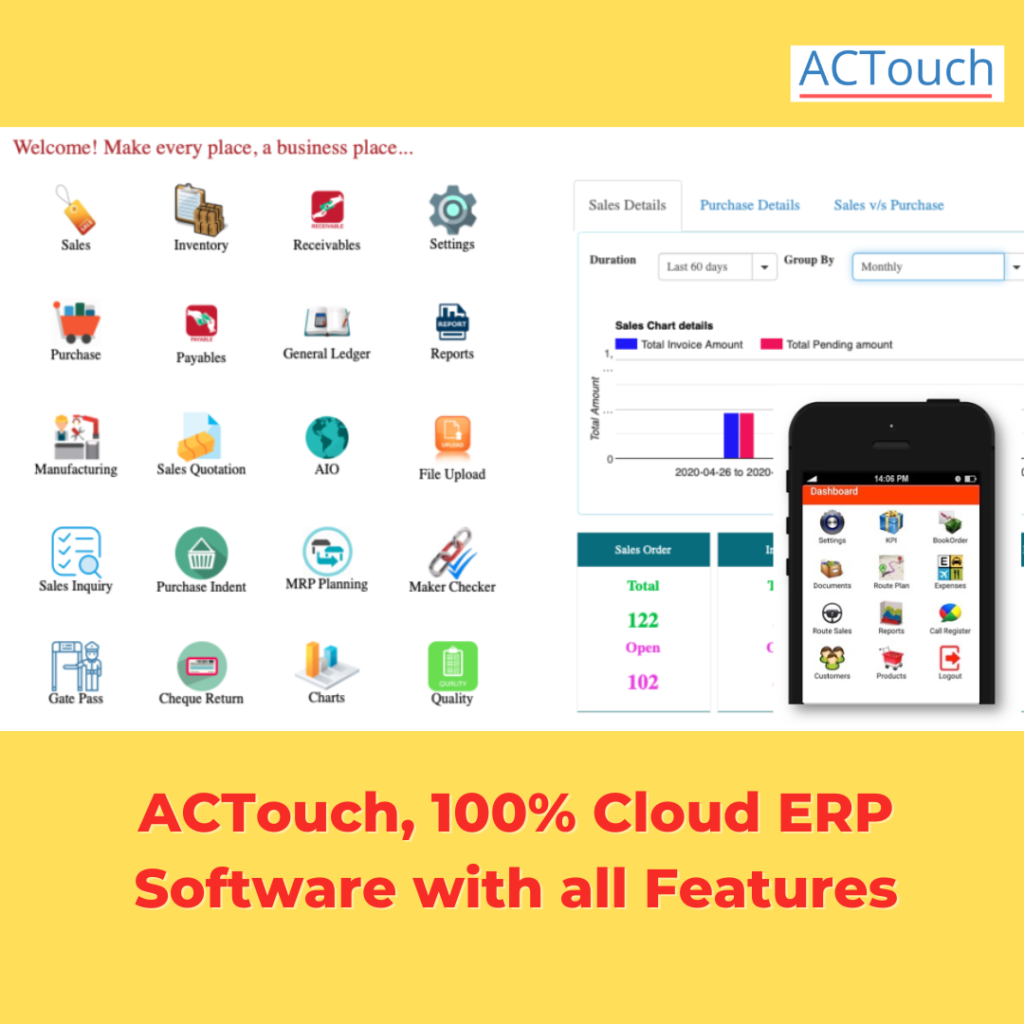
Today right information is available to people and there is no restriction to access them. This lead to change in the belief system and every business owner wants to improve their business process by reducing the cost and increasing the efficiency. One of the way to do to is going for a cloud ERP for small business as it would reduce the cost of ownership, cheap license costs, better and easy to use services and be part of the ecosystem. One of the easy way to follow internationally accepted practice is to implement a Best Cloud ERP Software that comes with best of the practices, Controls & measures and Easy of Use.
Best Cloud ERP Software for Small Business in India- ACTouch Cloud Based ERP
Implementation of a good ERP software will help many mid sized companies to optimise their business process, improve entire vendor and supply chain management, increase transparency across the departments and provide more clarity. Introduction of ERP in an organisation helps it move up the value chain in terms of market credibility and building the confidence of its stakeholders. The current business challenges including lack of resources forced many SMEs to look for a Cloud ERP Software.
ERP Software Price
Benefits of Cloud-Based ERP for Small Business
Cloud ERP Software: Which is the Best Cloud ERP System for Small Business?
SMEs use the following methods to avoid the need of an Cloud ERP Software.
- Running an accounting software as ERP even though that Accounting software is age old.
- Doing the work on an Excel fearing of loosing data to external person or caught by Govt.
- Customize the existing accounting software with more modules and spend more money.
- Develop a homegrown ERP with a feeling that data is secure with them.
Question: Who Runs your business?
To please a few people / Accountants, many business owners stick to age old accounting system and loose large business opportunities. They tie themselves to old process and problems.
Many SME owners do not realize the business losses due to lost business opportunity due to lack of right information, not having cost sheets. Spending huge amount of non-productive time, not able to meet market demands and customer needs.
Cloud ERP System: How Cloud-Based Manufacturing ERP helps Small Business?
Do you have any of these questions & do you get answers for them?
Many Business Owners do not get an answer to these questions as their software doesn’t help. Most of the accounting software’s are designed for Compliance and Taxes and not for business growth. They always threaten you by penalties or loosing money etc.
- What is the cost of my product and finished goods.
- Where is my stock and how many are with my subcontractors?
- How much material came from my Customer and where they are?
- What is my production today and how much scrap?
- How much tax, I have to pay this month? We have noted down few answers based on the customer feedbacks.
Our interaction with more than 1200 customers have helped us to consolidate them.
- Integrate many business functions leading to transparency, access to real time information.
- Following an industry standard best practice. Some of best features are added into product and its easy to implement and follow
- Align business objectives with technology solutions to improve. Reduce the resource usage and improve productivity
- Another key reason for the choice of an ERP against a development getting a quicker return on investment with international ERP software
- Achieve better organizations resource and asset utilization. Improve utilization of human capital and assets
- Obtain right Information at right time for effective decision making
- Improve financial management and compliance’s.
Some of the best ERP Implementation methodology is adopted by ACTouch.com. Click here to read more.
Why use Cloud-Based Manufacturing ERP?
Organisations opt for Cloud Based ERP for several reasons:
- Scalability: Cloud ERP systems can easily scale up or down based on business needs, allowing companies to adapt to growth or changes.
- Accessibility: Users can access the system from anywhere, facilitating remote work and collaboration.
- Reduced IT Costs: Cloud ERP eliminates the need for on-premises hardware and maintenance, reducing infrastructure costs.
- Automatic Updates: Cloud ERP providers often handle system updates, ensuring that the software is up-to-date and secure.
- Integration: Cloud ERP can integrate with other cloud-based applications, enhancing overall efficiency.
ERP Software Companies in Bangalore, India
Cloud ERP Software: Comparison of ERP Software
There are many ERP software in the market. As a part of our sales process, we do review and compare us with other software. Here we are providing a list of Cloud ERP Software. (We are not mentioning any Accounting or Partial software)
- SAP B1 (Both available on Cloud and On-Premise model)
- TCS iON
- NetSuite
- Oracle Apps
- ACTouch, a 100% cloud ERP with mobile Apps.
- Infor
Following are functionalities that Cloud ERP System / Web Based ERP has
Basic Modules of Cloud ERP System.
- Sales and Invoices
- Purchase and Goods Receipts
- Inventory Control
- Payments
- Receipts
- Manufacturing
- General Ledgers
- Financial control and reports
- GST and other Taxes
“Good to have” Modules – ERP Business Modules.
We identified the below modules as a good to have as these may not be mandatory for 80% of business owners.
- Quality
- Warranty Modules
- HRMS or Payroll
- Sales Quotation
- CRM functionalities
- Plant Maintenance
For more details, click here.
Recently we compared ACTouch Cloud ERP System against other Cloud ERPs as few customer demanded. Please check here
Best Contract manufacturing ERP? Click here
Cloud ERP Software: What are the problems in Best ERP Software Selection and implementation?
Many Business owners do not understand the complexity of their business or bringing them into Cloud ERP Solutions. Typically they underestimate the efforts needed and what to do etc. They need a constant guidance and hand holding during this process. The summary of problems faced by many Business Owners are as below.
- Which Best ERP Software to select?
- Who is the right partner to implement ERP?
- What modules to implement and how to begin?
- What is the time frame to implement and how many days required?
- Do my employees have the capability to understand, implement and use the application?
- Whats the implementation process to follow, how to measure the success etc
Many of these questions will be resolved as the implementation begins. However its important that we need to identify those risks and should’ve a mitigation plans. For more details on how to do an implementation and check list, please click here
Difference between Web based ERP and cloud ERP?
The terms “Web Based ERP” and “cloud ERP” are sometimes used interchangeably, but there are differences.
A web-based ERP typically refers to an ERP system that is accessed through a web browser but might be hosted on-premises. In contrast, a cloud ERP is specifically hosted on remote cloud servers, providing benefits like scalability, accessibility, and automatic updates.
While both offer remote access, cloud ERP typically offers a broader range of cloud-specific advantages.
Cloud Based ERP Software Examples and free downloads
Now a days, many ERP vendors allow their product to be installed, configured and implemented before buying them. So the sales process has been changed and future customers are involved in the decision making process. This gives confidence and also helps vendor to manage customer expectations. Visit the respective web portal and download them or go to ACTouch.com, register “Freely” and try the Application. Please find the list as below.
Many more are there. Disclaimer: Anything to be updated or to be added / any comments and feedbacks to sales@actouch.com
FAQs on Cloud ERP Software
1. What is a cloud ERP system?
Cloud ERP (Enterprise Resource Planning) system refers to a software solution that combines various business processes and functions into a unified platform hosted on cloud servers. Unlike traditional on-premises ERP systems, cloud ERP operates over the internet, allowing organizations to access and manage their critical business operations from anywhere with an internet connection. This includes functions like finance, human resources, supply chain management, customer relationship management, and more.
2. What is an example of a cloud ERP?
An example of a cloud ERP system is NetSuite, which is a widely used cloud-based ERP solution offered by Oracle. NetSuite provides companies with a comprehensive suite of applications for managing their business processes in real-time through a centralized cloud platform. It covers areas such as financial management, inventory and supply chain, e-commerce, customer relationship management, and more.
3. What are the cloud ERP types?
Cloud ERP systems can be categorized into three main types:
- Public Cloud ERP: These are ERP systems hosted by third-party service providers and accessible over the internet by multiple organizations. Examples include NetSuite, Microsoft Dynamics 365, and SAP Business ByDesign.
- Private Cloud ERP: In this setup, the ERP system is hosted on a private cloud infrastructure, often within an organization’s own data centers, providing more control and security.
- Hybrid Cloud ERP: This combines elements of both public and private cloud setups, allowing companies to maintain critical data on-premises while utilizing cloud services for less sensitive functions.
4. How to implement cloud ERP?
Implementing a cloud ERP system involves several steps:
- Planning: Define objectives, scope, and requirements for the ERP system.
- Vendor Selection: Choose a suitable cloud ERP provider based on your needs.
- Data Migration: Transfer existing data to the new system.
- Configuration: Customize the ERP to match your business processes.
- Testing: Ensure the system functions as intended through thorough testing.
- Training: Train employees to use the new system effectively.
- Go-Live: Launch the system and transition to using it for daily operations.
5. What are the disadvantages of cloud ERP?
Disadvantages of cloud ERP include:
- Security Concerns: Hosting sensitive business data off-site raises security and privacy concerns, although cloud providers often employ robust security measures
- Connectivity Dependencies: Reliable internet access is essential for using cloud ERP effectively; downtime or slow connections can disrupt operations.
- Data Transfer and Integration: Migrating existing data to the cloud and integrating with other systems can be complex and time-consuming.
- Limited Customization: Some cloud ERP systems might have limitations on customization to ensure compatibility with updates.
- Long-Term Costs: While initial costs might seem lower, long-term subscription fees can accumulate, potentially exceeding on-premises solutions in the long run.
ERP Solution Providers in Bangalore, India | ACTouch Cloud ERP
More information, click here
- Check here the ACTouch ERP Features
- How to implement an ERP Software that’s easy and quick to do?
- Problems that are faced by an ERP implementation
eMail us at sales@actouch.com for a free ERP product demo.
Migrate to 100% Cloud ERP Software Now and enjoy the FREEDOM | ||
 | Talk to us to know more about ACTouch Cloud ERP Software NOW  |